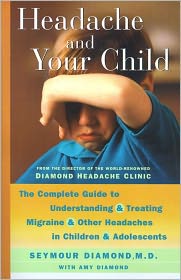Children who get frequent headaches and migraine attacks have chronic illness. Such children and their parents face problem to adjust with school and their rules. Extra preparations and steps should be taken to cope with such illness. Pediatric specialist in migraine and headaches exist should be consulted for treatment and other precautionary & preventive measures. Also the triggers vary from child to child, which should be recognized accurately.
Firstly, it is the strict attendance rule in most of the schools that children with chronic illness find it difficult to deal with. To add to it, majority of the schools have zero tolerance policy regarding medications, even including over the counter medicines. Reports of students getting expelled for merely carrying Advil in school with them are common. Prior to making appointment with the doctor, it is recommended that parents read the policy of the school the child is attending. It is good to ask questions before hand, than feeling sorry later. Some of the schools asks for letter or medical record as a proof, incase the student didn’t attend because of a health problem. Some schools consider sick leaves as regular leaves and in this case, the attendance gets affected greatly.
School nurses can be given the prescribed medicine so that they can give the medicine to the child at the required time. If this is the case, things such as medicine storage location and availability of substitute should be checked. Apart from not attending regularly, the child can sometimes be unable to take part in co-curricular activities especially physical education and outdoor recess. Other possible options should be discussed with the teacher. Usually a recommendation letter from the physician will do the needed. In all the cases, some kind of medical identification can be carried by the child at all times. If the child is attending an after school babysitter or program, directly after school, extra measures should be taken. The babysitter or program in charge should be told about the problem in advance. Their cooperation can be asked for timely administration of the medicine and for taking special care of the child. If the child himself is grown enough to understand the matter, the child should be educated about taking medications. They should also be made to understand that it is harmful to take medicines from any un-trustable source even if their fellow students do. Budge them to ask questions and clarify any of their fears of concerns.
Most of the children lack the ability to convey their problem properly. The situation is further aggravated because of different kinds of headaches. They can be related to chronic illness, tension, sinus or fever. Only diagnosis can bring out the correct problem. If the rate of headache becomes more frequent, like more than twice a month, doctor’s appointment should be taken instantly. Younger kids find it more difficult to explain the problem. If they become cranky, restless, irritating, tired, is having sleeping disorders and is not eating properly, a problem surely exists. Most of the children complain of headaches during exams because of increased stress. Seventy five percent of the children experience headaches because of tension. If so, stress management education, along with counseling, should be given to the kid.
Headaches can be an indication of other problems, too. So, thorough diagnosis is highly recommended. The child’s previous medical history provides important clue. Prior to the doctor’s appointment, notes can be made after referring the medical history. Maintaining a log about the child’s headache frequencies, pain location, time of occurrence, symptoms, etc. also helps. If not due to illness, headaches can also be a result of head injury. Sometimes, headache can be hereditary, like in the case of migraines.
Headaches can also be caused because of infections, vision problems, odd levels of blood pressure, neurological problems, muscle weakness, improper ear balance or serious problems such as tumor, blood clots, etc. If the doctor is not able to diagnose the problem, he/she can refer the child to a headache specialist or neurologist. Test such as CT scan or MRI are done if there is a serious problem. After the diagnosis, the doctor prescribes medication or will ask to take over the counter medicines. According to a study, children who face headaches and migraine take overdose of over the counter medicines for immediate pain reliving. In some of the cases, the parents are clueless about this situation. This practice is risky and mostly children above six years are involved in such cases.


